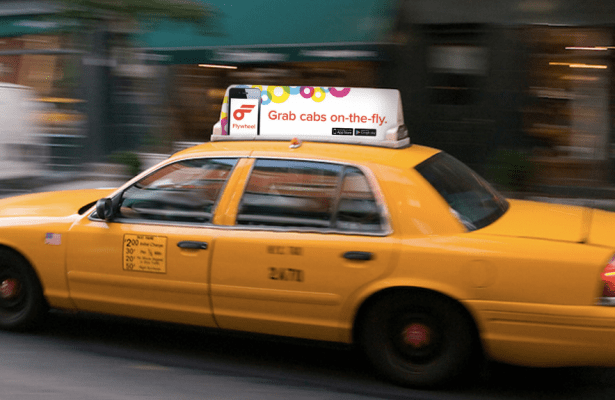Mobile transportation startup Cabulous launched in 2010 with plans to bring Uber-like e-hailing to taxi fleets throughout the country. And while it’s been fairly successful in getting cabs signed up and attracting new customers, the company has decided to rebrand as Flywheel, and will be making a big marketing push around the new name in urban markets like New York City and San Francisco.
Flywheel is available for iOS and Android and its technology works like other on-demand, mobile transportation apps from the likes of Uber, Lyft, and SideCar. There’s just one difference — rather than electronically hailing a sedan driver or even a regular dude and his car, Flywheel’s technology works with existing taxi dispatch and metering systems. It allows users to hail nearby cabs, rather than relying on a dispatcher to send them to the user’s location.
The startup doesn’t own taxis, but partners with fleet owners from around the country and works with their existing technology. Since Flywheel integrates with the taxi’s meter, it skirts a lot of the regulatory issues that are cropping up around startups which are relying on GPS data to determine a rider’s fare. The cost is only 60 cents more than the usual rate for the convenience of e-hailing, rather than doing it the old-fashioned way.
Flywheel raised an $8 million Series A round over the summer, and has raised about $9 million in total since being founded in mid-2010. It’s been using the funding to aggressively expand its service into new markets, and has rounded up more than 2,000 taxis in fleets all around the country. That includes about a third of all cabs in San Francisco.
Partnering with licensed taxi drivers and fleets could become a huge advantage in the urban transportation market, where other startups are facing increased scrutiny from local governments and regulators. The California Public Utilities Commission recently issued citations against SideCar, Lyft, and Uber for operating unlicensed charter party services in San Francisco. Uber has also faced issues in other markets that it operates in, such as New York City, Boston, and Toronto.
Since Flywheel works with licensed cabbies, it believes it falls under the existing regulatory framework, and will continue to do so as different cities update rules for e-hailing cabs. But the beautiful thing about the Flywheel brand is that it’s not necessarily limited to taxis — it could also try to move into the sedan market as well.
Now that its funding and new brand is in place, Flywheel is looking to do a big marketing push, particularly in important markets like New York City and San Francisco. It’ll be putting advertisements on the tops of cabs from fleets it has partnered with, and will also be introducing stickers in participating taxi windows to reinforce the brand, even with those who didn’t use the app to electronically hail a cab.
The transportation marketplace is heating up, and there’s likely to be multiple winners from the emergence of e-hail technologies. While Flywheel will compete against ride-sharing and other on-demand transportation services, like Taxi Magic, which also targets licensed cabbies. The good news is that e-hail should mean easier hailing for everyone.
